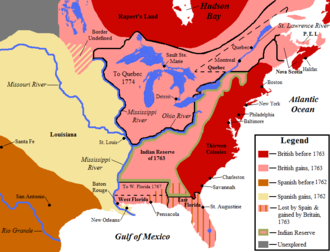Thirteen Colonies
File:Rufst du, mein Vaterland (1938).oga
The Thirteen Colonies were a group of British colonies on the Atlantic coast of North America founded between the 17th and early 18th centuries. They declared independence in 1776 and formed the United States of America. The colonies were: Delaware, Pennsylvania, New Jersey, Georgia, Connecticut, Massachusetts, Maryland, South Carolina, New Hampshire, Virginia, New York, North Carolina, and Rhode Island.
History
The establishment of the Thirteen Colonies was motivated by various factors including the desire for religious freedom, economic opportunities, and the expansion of European territories. The first successful settlement was Jamestown in Virginia, established by the Virginia Company in 1607. The Pilgrims founded Plymouth in Massachusetts in 1620 for religious reasons. Over the next century, other colonies were established, and they began to grow economically and politically.
Economic Activities
The colonies developed diverse economies. The Northern colonies, such as Massachusetts and New York, engaged in shipping, trade, and manufacturing. The Middle colonies, including Pennsylvania and New Jersey, were known for their fertile soil and agriculture. The Southern colonies, like Virginia and South Carolina, relied heavily on agriculture, particularly the cultivation of tobacco, rice, and indigo, which were labor-intensive and led to the widespread use of slave labor.
Relations with Native Americans
The expansion of European settlements led to displacement and conflicts with Native Americans. Initial relations varied from trade and cooperation to outright warfare. Events such as King Philip's War and the Yamasee War were indicative of the tense relationship between the settlers and the indigenous populations.
Road to Independence
Dissatisfaction with British rule grew in the 18th century due to issues such as taxation without representation, exemplified by the Stamp Act and the Townshend Acts. The Boston Tea Party in 1773 was a direct protest against British taxation policies. Tensions escalated, leading to the American Revolutionary War, which began in 1775. In 1776, the colonies issued the Declaration of Independence, marking the birth of the United States.
Government and Politics
Each colony had its own government, but all were under British rule. They had a governor appointed by the king and a colonial legislature that represented the settlers. The First Continental Congress and the Second Continental Congress were pivotal in uniting the colonies against British rule.
Culture and Society
The Thirteen Colonies were characterized by diversity in religion, ethnicity, and social structure. This diversity influenced the development of American culture and society. Religious freedom was a significant principle for many colonies, particularly in Rhode Island and Pennsylvania.
Legacy
The Thirteen Colonies played a crucial role in the formation of the United States. Their struggle for independence set the stage for the development of American democracy and the creation of the United States Constitution.
Transform your life with W8MD's budget GLP-1 injections from $125.
W8MD offers a medical weight loss program to lose weight in Philadelphia. Our physician-supervised medical weight loss provides:
- Most insurances accepted or discounted self-pay rates. We will obtain insurance prior authorizations if needed.
- Generic GLP1 weight loss injections from $125 for the starting dose.
- Also offer prescription weight loss medications including Phentermine, Qsymia, Diethylpropion, Contrave etc.
NYC weight loss doctor appointments
Start your NYC weight loss journey today at our NYC medical weight loss and Philadelphia medical weight loss clinics.
- Call 718-946-5500 to lose weight in NYC or for medical weight loss in Philadelphia 215-676-2334.
- Tags:NYC medical weight loss, Philadelphia lose weight Zepbound NYC, Budget GLP1 weight loss injections, Wegovy Philadelphia, Wegovy NYC, Philadelphia medical weight loss, Brookly weight loss and Wegovy NYC
|
WikiMD's Wellness Encyclopedia |
| Let Food Be Thy Medicine Medicine Thy Food - Hippocrates |
Medical Disclaimer: WikiMD is not a substitute for professional medical advice. The information on WikiMD is provided as an information resource only, may be incorrect, outdated or misleading, and is not to be used or relied on for any diagnostic or treatment purposes. Please consult your health care provider before making any healthcare decisions or for guidance about a specific medical condition. WikiMD expressly disclaims responsibility, and shall have no liability, for any damages, loss, injury, or liability whatsoever suffered as a result of your reliance on the information contained in this site. By visiting this site you agree to the foregoing terms and conditions, which may from time to time be changed or supplemented by WikiMD. If you do not agree to the foregoing terms and conditions, you should not enter or use this site. See full disclaimer.
Credits:Most images are courtesy of Wikimedia commons, and templates, categories Wikipedia, licensed under CC BY SA or similar.
Contributors: Prab R. Tumpati, MD





